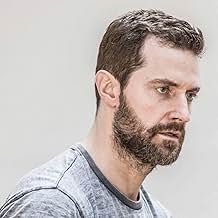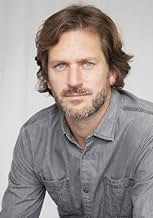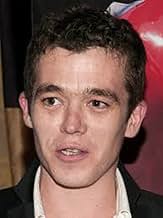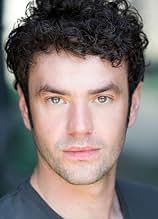IMDb-BEWERTUNG
5,9/10
7002
IHRE BEWERTUNG
Im Irland des 13. Jahrhunderts muss eine Gruppe von Mönchen eine heilige Reliquie durch eine Landschaft voller Gefahren eskortieren.Im Irland des 13. Jahrhunderts muss eine Gruppe von Mönchen eine heilige Reliquie durch eine Landschaft voller Gefahren eskortieren.Im Irland des 13. Jahrhunderts muss eine Gruppe von Mönchen eine heilige Reliquie durch eine Landschaft voller Gefahren eskortieren.
- Auszeichnungen
- 1 Gewinn & 3 Nominierungen insgesamt
Akilas Karazisis
- The Killer
- (as Akillas Karazisis)
Gaëtan Wenders
- Fournier
- (as Gaetan Wenders)
Empfohlene Bewertungen
Out of the creeping faerie mist of a dark age comes an intensely suspenseful tale about why we choose our allegiances. This is the heart of the story - our reasons make no sense.
The drama revolves around a lump of rock. That any other lump could replace it at any time and no-one would notice is openly stated in the dialogue. It's the stark question woven through the plot - is faith taken on faith alone really worth fighting for?
It's a tense film, beautifully written and exquisitely acted. Each viewer decides what the film's about - it doesn't explain itself, it falls silent. Everyone will see something different. Some might conclude we're all compelled towards war whether we like it or not. Some might decide we're all in league with the Devil whether we know it or not. Some might believe we're all still lost in the creeping faerie mist clutching for something to save us.
Some reviewers didn't rate it highly as an action thriller but it's not a superficial movie and maybe doesn't fit into that genre. There's far more being shown in the subtext and the themes than being told in the action. As for the excessive violence, I felt it merely conveyed the grim reality of melee combat. After all, hidden in the word 'Pilgrimage' is the word 'grim'.
It's a mark of a brilliant film when after seeing it once you must see it again. On the second viewing, it bit me deeper on the neck and made me more its thrall.
For me, the main highlight was Jon Bernthal's acting. It was haunting. He played a voiceless man who served the monks as the lowliest of their group and I fell in love with his tragic integrity. He reminded me of another tormented anti-hero of contemporary myth - Angel from 'Buffy The Vampire Slayer': the vampire cursed with a soul, plagued by a weight of remorse for a hellish past. Both crave absolution and will do anything to receive it.
I loved 'Pilgrimage'. It was a strangely beguiling hybrid of superstitious medievalism clashing with an ancient landscape alive with pre-existing belief. And the ending was satisfyingly unsatisfying - like all good fairy tales are.
The drama revolves around a lump of rock. That any other lump could replace it at any time and no-one would notice is openly stated in the dialogue. It's the stark question woven through the plot - is faith taken on faith alone really worth fighting for?
It's a tense film, beautifully written and exquisitely acted. Each viewer decides what the film's about - it doesn't explain itself, it falls silent. Everyone will see something different. Some might conclude we're all compelled towards war whether we like it or not. Some might decide we're all in league with the Devil whether we know it or not. Some might believe we're all still lost in the creeping faerie mist clutching for something to save us.
Some reviewers didn't rate it highly as an action thriller but it's not a superficial movie and maybe doesn't fit into that genre. There's far more being shown in the subtext and the themes than being told in the action. As for the excessive violence, I felt it merely conveyed the grim reality of melee combat. After all, hidden in the word 'Pilgrimage' is the word 'grim'.
It's a mark of a brilliant film when after seeing it once you must see it again. On the second viewing, it bit me deeper on the neck and made me more its thrall.
For me, the main highlight was Jon Bernthal's acting. It was haunting. He played a voiceless man who served the monks as the lowliest of their group and I fell in love with his tragic integrity. He reminded me of another tormented anti-hero of contemporary myth - Angel from 'Buffy The Vampire Slayer': the vampire cursed with a soul, plagued by a weight of remorse for a hellish past. Both crave absolution and will do anything to receive it.
I loved 'Pilgrimage'. It was a strangely beguiling hybrid of superstitious medievalism clashing with an ancient landscape alive with pre-existing belief. And the ending was satisfyingly unsatisfying - like all good fairy tales are.
As far as period pieces set in the middle ages go, this one isn't very glamorous. It's a decently well made film with some strong individual performances that basically carry a mostly disjointed and only slightly nuanced story. My rating for this movie is a fairly weak 7/10. That rating is floated higher than I would have normally given it for three specific reasons.
First, the performances: Holland as the young, pious monk who has never known anything but life in the monastery yet quickly matures when faced with adversity. Bernthal as the obedient and entirely subservient mute with an obviously profound yet mysterious history who becomes the star of the show on more than one occasion without saying a word. Stanley Weber as the Cistercian, the guy the Church sends out to do their dirty work basically and effectively starts the "Pilgrimage" in the first place. Of course, there's also Richard Armitage as the surly French knight commanding his Baron father's equally surly men while throwing surly looks around all the time. This would have been a horribly dull and hard to watch movie if these guys didn't pull off these fairly typical medieval character archetypes well and it feels to me like they did.
Second, the action and set sequences were well done. I tend to be the kind of person who is immediately thrown off by a bad transition or a sequence of shots that just don't really work well together. I didn't see very much of that in this film. Granted, it's not difficult managing scene transition when most every scene is shot outdoors in Ireland but when the action happens, it's brutal and effective.
Third, symbolism. If you are someone who does not like it when a movie expects you to draw your own significance from the story it's trying to tell, this is not a movie you might like. Religion is a central theme in this movie and it is built on a foundation of symbolism that can be taken any number of different ways. If you like diving into the deeper meaning of things, you will actually love this movie. Especially how it ends.
First, the performances: Holland as the young, pious monk who has never known anything but life in the monastery yet quickly matures when faced with adversity. Bernthal as the obedient and entirely subservient mute with an obviously profound yet mysterious history who becomes the star of the show on more than one occasion without saying a word. Stanley Weber as the Cistercian, the guy the Church sends out to do their dirty work basically and effectively starts the "Pilgrimage" in the first place. Of course, there's also Richard Armitage as the surly French knight commanding his Baron father's equally surly men while throwing surly looks around all the time. This would have been a horribly dull and hard to watch movie if these guys didn't pull off these fairly typical medieval character archetypes well and it feels to me like they did.
Second, the action and set sequences were well done. I tend to be the kind of person who is immediately thrown off by a bad transition or a sequence of shots that just don't really work well together. I didn't see very much of that in this film. Granted, it's not difficult managing scene transition when most every scene is shot outdoors in Ireland but when the action happens, it's brutal and effective.
Third, symbolism. If you are someone who does not like it when a movie expects you to draw your own significance from the story it's trying to tell, this is not a movie you might like. Religion is a central theme in this movie and it is built on a foundation of symbolism that can be taken any number of different ways. If you like diving into the deeper meaning of things, you will actually love this movie. Especially how it ends.
Yes this film is bloody. For some the scenes might even be shocking, but I really enjoyed this film. Acting was good, the suspense build up was very good. And at no point did it seem the violence was unnecessary. If you enjoy historical type films and don't mind seeing a head bashed in close up, you will enjoy this.
Well cast and acted. Visually pleasing and plenty of well performed action. If this is your genre you'll enjoy it
This strong, atmospheric, and beautifully-made little film did not disappoint based on reviews that either put it in the trash for "gratuitous violence" or gave it a firm pat on the head for a good attempt.
I see the value in the latter assessment - working on a budget, this film does a lot with what it has, providing hauntingly beautiful vistas of an ancient Ireland and making its story stretch beyond its small shooting framework. The actors, too, make so much of the script they've been given, with great performances throughout. Although this does lead me onto the main drawback of the film: the characters are largely undeveloped, especially that of Diarmuid - who is the protagonist no less - and his Brothers. We can see that he cares about them a lot - after all, "the monastery is all he's ever known" - but more development would have been crucial to making me really care about whether they lived or died, failed or succeeded. The most interesting characters for me were Geraldus and the Mute, "grey" characters whose backstories are hinted at if never fully disclosed, and with sublime subtlety in the case of Bernthal's character. The characters we do get to truly see are rewarding, albeit darkly, and were one of the film's greatest triumphs - it just would have been great to see the same treatment given to the lead protagonist and primary villain.
In the other camp, I don't think the story could have worked without the levels of violence, savagery, and loss that we see, which the viewer must witness with the same unblinking acceptance that the characters do. In this, there is a hidden depth to Pilgrimage, a story about Ireland, the land where "there was never peace". One review focused around the particular Irishness of the film rang true in some places - that the colour shown here is multiple shades of grey, and little green - if not in others. This is not a deconstruction of the "Irish" mythos, but it does touch, tenderly and reverentially, upon the idea of an unattainable relic: to know peace, both within and without, a dream not limited to this country but echoed in Jerusalem and beyond. Though it does not present its findings in a wholly satisfying parcel, the film did provoke thought about where that quest for peace could lead us next - to what bloody ends or watery graves? To what loss and to what triumphs?
"Where to now?"
I see the value in the latter assessment - working on a budget, this film does a lot with what it has, providing hauntingly beautiful vistas of an ancient Ireland and making its story stretch beyond its small shooting framework. The actors, too, make so much of the script they've been given, with great performances throughout. Although this does lead me onto the main drawback of the film: the characters are largely undeveloped, especially that of Diarmuid - who is the protagonist no less - and his Brothers. We can see that he cares about them a lot - after all, "the monastery is all he's ever known" - but more development would have been crucial to making me really care about whether they lived or died, failed or succeeded. The most interesting characters for me were Geraldus and the Mute, "grey" characters whose backstories are hinted at if never fully disclosed, and with sublime subtlety in the case of Bernthal's character. The characters we do get to truly see are rewarding, albeit darkly, and were one of the film's greatest triumphs - it just would have been great to see the same treatment given to the lead protagonist and primary villain.
In the other camp, I don't think the story could have worked without the levels of violence, savagery, and loss that we see, which the viewer must witness with the same unblinking acceptance that the characters do. In this, there is a hidden depth to Pilgrimage, a story about Ireland, the land where "there was never peace". One review focused around the particular Irishness of the film rang true in some places - that the colour shown here is multiple shades of grey, and little green - if not in others. This is not a deconstruction of the "Irish" mythos, but it does touch, tenderly and reverentially, upon the idea of an unattainable relic: to know peace, both within and without, a dream not limited to this country but echoed in Jerusalem and beyond. Though it does not present its findings in a wholly satisfying parcel, the film did provoke thought about where that quest for peace could lead us next - to what bloody ends or watery graves? To what loss and to what triumphs?
"Where to now?"
Wusstest du schon
- WissenswertesTo prepare for his role, Jon Bernthal spent the first few weeks of shooting completely silent, even when he's not on set.
- PatzerAlle Einträge enthalten Spoiler
Top-Auswahl
Melde dich zum Bewerten an und greife auf die Watchlist für personalisierte Empfehlungen zu.
- How long is Pilgrimage?Powered by Alexa
Details
- Erscheinungsdatum
- Herkunftsländer
- Sprachen
- Auch bekannt als
- El sacrilegio
- Drehorte
- Produktionsfirmen
- Weitere beteiligte Unternehmen bei IMDbPro anzeigen
Box Office
- Budget
- 4.749.500 € (geschätzt)
- Weltweiter Bruttoertrag
- 23.689 $
- Laufzeit
- 1 Std. 36 Min.(96 min)
- Farbe
- Sound-Mix
- Seitenverhältnis
- 2.35 : 1
Zu dieser Seite beitragen
Bearbeitung vorschlagen oder fehlenden Inhalt hinzufügen































